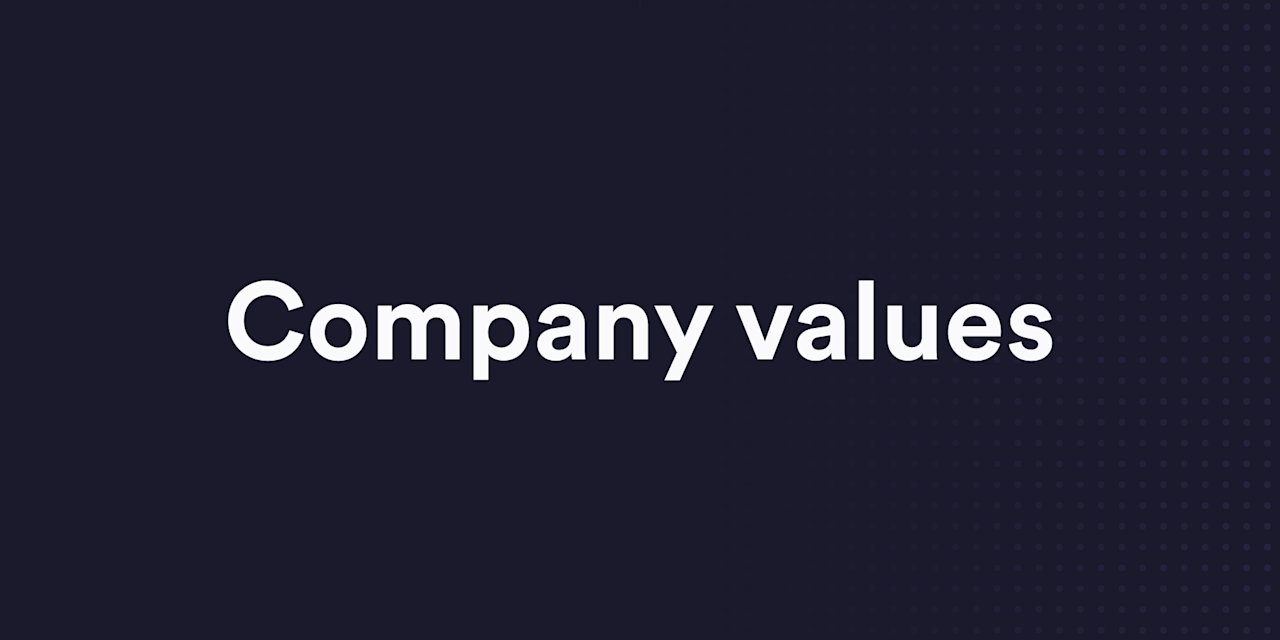


Initially, I was resistant to having company values. I thought values were just one of those checkbox things you do as a company when you get corporate. But as the team has grown, I've come to realize that if done the right way values can be an excellent tool.
Great values are simply an articulation of how the founder(s) and team culture already are.
Here's some guiding principles that shaped our approach:
Most company values are BS / worthless. We should only articulate values if they are useful.
Our values must have credible opposites. There is no point to just saying nice things that we should obviously aspire to.
The values should be divisive. If we're just saying things most people would agree with, there's no point to saying them.
Here is how we intend to use the values:
To inform decision making
To shape who we are, both for hiring and self improvement
To move in the same direction as we grow the team
The dYdX Values
Think 10x bigger
We challenge ourselves to think 10x bigger. We exclusively focus on driving exponential outcomes. We focus on what we could achieve, rather than trying to protect what we have. We are long term focused, and realize our goals will take years to achieve. We accept that we will likely not entirely achieve our goals. We are motivated by the chance that we do.
Don’t be motivated by fear
We face what we fear head on, and move through it. We make bold decisions. We embrace doing things that are nonstandard. We are transparent, vulnerable, and confident. We are our authentic selves and aim to only do things we love.
A players only
We only hire world class talent. We do not hire if we have not yet found an A player for the role. We only work with people we genuinely like and are motivated by. We strive to be the same version of ourselves at work, home, and play. We invest in forming deep and long term relationships with coworkers.
Ruthlessly prioritize
We ruthlessly prioritize and continuously ensure we are working the highest value tasks. We are not distracted by things that do not drive us towards our goal. We cut scope so much it makes us think “wait this seems like too much”. Our favorite thing is deciding not to do work. We pick one direction, and go all in.
One level deeper
We continuously push ourselves to understand what is important one level deeper than our current level of understanding. We hunger to discover the fundamental reason. We think for ourselves, from first principles, and ignore everything else. We trust our intuition.
FAQs
These were all great questions raised by the team as we thought through the values
Each value should have a credible opposite. What is the opposite of each of these values?
Think 10x bigger → Maximize chance of success
We always shoot for what gives us the best chance to be successful. We set realistic goals that we can have confidence in. We believe iteration is the most reliable way to improve
Don’t be motivated by fear → Be safe, consistent, and respectful
We take calculated bets and hedge our downside. We want ourselves, our coworkers, and our customers to feel safe and comfortable. We listen to the wisdom of the community, and prioritize full alignment. We realize there is a lot at stake and therefore prioritize safety and consistent excellence.
A players only → Scale quickly
We believe crypto is a massive opportunity where winners will take most. To capture this, we will aggressively grow our market share to establish a dominant market position. To do this we will hire aggressively, and develop the talent we bring on. We accept that we will have to make small compromises on who we hire to accomplish this.
Ruthlessly prioritize → Parallelize aggressively
Crypto is still an early market, and we don’t know what will prove most valuable to focus on. To maximize our chances we should take as many shots as we can. This will give us the best chance of building the next big thing in crypto. We prioritize feature completeness & quality above speed.
Understand one level deeper → Execution comes first
Once we have sufficient information, we execute immediately. This will make us move faster. We prioritize breadth over depth of understanding. We hire experts to acquire specific knowledge we don’t ourselves have. We trust leaders and decisions even when we don’t fully understand.
How do we use the values if they seem to conflict?
The values are roughly ordered by priority with the most important ones at the top. For a given situation, we should aim to maximize the values multiplied by importance.
Join us
If this resonated with you, check out our open roles!
Also check this page out to learn more about working at dYdX 👀